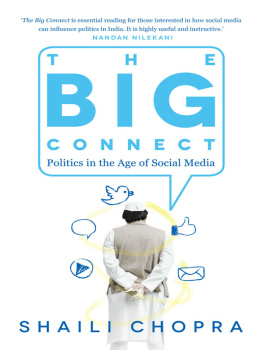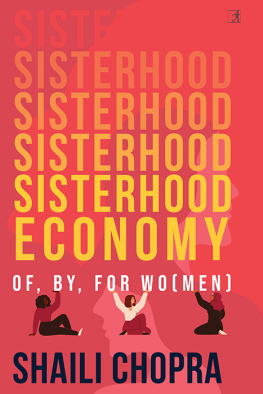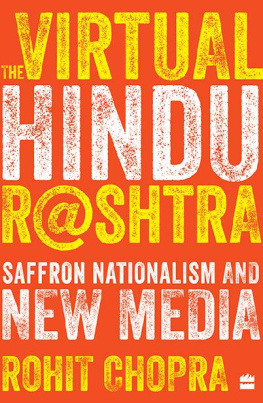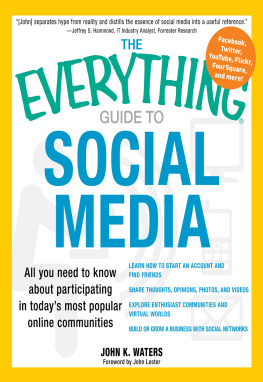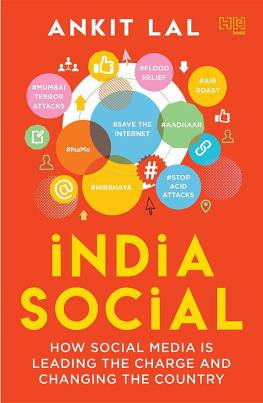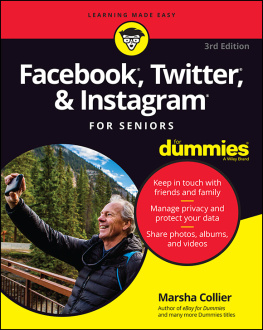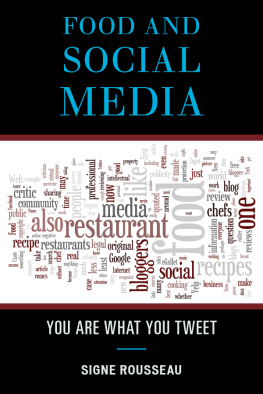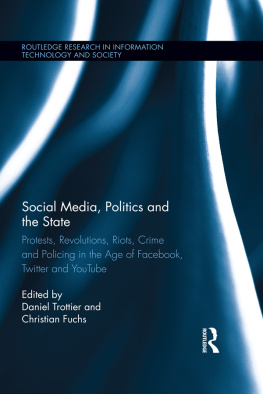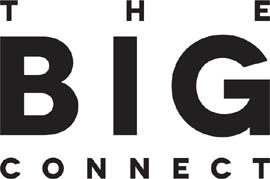



Published by Random House India in 2014
Copyright Shaili Chopra 2014
Random House Publishers India Private Limited
Windsor IT Park, 7th Floor, Tower-B
A-1, Sector-125, Noida-201301, UP
Random House Group Limited
20 Vauxhall Bridge Road
London SW1V 2SA
United Kingdom
This eBook is copyright material and must not be copied, reproduced, transferred, distributed, leased, licensed or publicly performed or used in any way except as specifically permitted in writing by the publishers, as allowed under the terms and conditions under which it was purchased or as strictly permitted by applicable copyright law. Any unauthorised distribution or use of this text may be a direct infringement of the authors and publishers rights and those responsible may be liable in law accordingly.
EPUB ISBN 9788184006087
Contents
Introduction
These days, social media waits for no one. If youre LATE for the party, youll probably be covered by all the noise and you might not be able to get your voice across. It could only mean that if you want to be heard by the crowd, you have to be fast; and on social media, that means you have to be REALLY fast.
Aaron Lee (@askaaronlee)
I n this new era, every tweet counts. Every view can be broadcast to the public at the click of a button. Social media has changed the way people think, write, and react. The desire for instant gratification coupled with the availability of networking platforms, or venting outlets as I call them, at your fingertips, has created voracious digital hunger. A common man or woman now feels empowered as they have a voice to express their opinions. Social media is defined exactly as youd thinka media for the society; for people to get more social and start a conversation. Whether its a thought, an opinion, a picture, a video, a quote you read somewhereyou can easily share whats on your mind with your network. For artistes, social media allows an interactive platform to gauge feedback in a matter of seconds. Everyone from politicians to actors, editors to opinionatorsa lethal combination of opinion makers and opinion terminatorsare virtually present and far more accessible than in real life. You can catch the pulse (and the impulse) of the public right here and pretty quickly. For anyone wanting to read the sentiment of people, the notion of a dipstick survey has been replaced by a tweet-stick survey.
While our social fingertips are new, less than a decade old, being social, of course, is an age-old idea. The social networks which people were familiar with before the wired networks arrived were aggregating in a town squares, going door to door to spread a message in a neighbourhood, blowing a trumpet to gather a group, public meetings for fixing a problem or a town hall to discuss leadership. Today the approach to campaigning in any election, championing any social cause, or seeking opinion has similarly moved to new platforms. Digital strategies are central to planning political rallies and elections. Party manifestos are no longer conspiracies of a coterie but laid bare in public eye. Canvassing demands a partys interactive presence on social platforms like Twitter, Facebook, Pinterest, YouTube, Google Plus and others. The public, once the outsiders, are now privy to a partys thought process. There is very little room to bungle up as every enunciation is analysed and commented upon. Politics today isnt just about getting elected. Its also about getting socially elected. Weve moved beyond just the traditional rallies, tents, hordes of people, naarebaazi, boom box speeches that surrounded every election. The promise of people online, their social endorsement, is what parties jostle for. Politicians are aware that they now must gratify people in both real and virtual worlds.
Social media connects people, gets them talking and sharing; allows campaigners to know the voters, target specific audience, splice demographics, mobilize support, and urge them to participate. When some of these people, otherwise part of the audience, get actively engaged in political debates, they become a great tool to spread the word and influence opinion. There will be about 149 million first-time voters in 2014. Majority of the first-time voters belong to a demographic to whom technology comes easy. Assuming that a significant chunk of these voters belong to urban India, then they can easily be targeted through social media. So for example, if the difference in votes between the Congress and BJP was just 40 million, could the Internet brigade be urged, provoked, inspired, and encouraged to bridge this gap? In the last election the number of people who voted in favour of Congress exceeded the BJP by 40 million. So this 40 million added to the fresh voters coming to polls, are now the big focus of the social media campaigns. Can social media influence these voters? The answer may not be an unequivocal yes, but it certainly isnt a no. Its an answer in progress.
Irrespective of campaigning and hash tag wars, the real impact of technology has been in sensitizing and popularizing voter registration among the youth. Politicians who are on social media have a better connection to their potential or existing audience than those who arent. Social media grants the power to lead, to follow. It even has the power to bring about change. There is no doubt that social media has become a pervasive force of impact and influence. However, a post, pin, or tweet doesnt necessarily translate into a vote. So the question is how much sway does social media actually hold in politics? How much influence do the trio of Facebook, Twitter, and Linkedin have on voters opinions, analysis, and ideas exchange? As an active denizen of the tweeting class, I saw an opportunity in exploring the role of social media right before a pivotal election. This book explores the impact social media is having not only to influence communication in general but also changing the way politicians are using specific tools to reach out to their electorate. At a time mainstream media is going by whats trending on Twitter, leaders realize the clout a simple post can have.
But there are more fundamental questions to answer. As these social avenues bring out the political best in some people, will it pull them out of their slumber and take them to voting booths? Can the online charisma of politicians backed by a dogged pursuit of converting them into votesthrough a contingent of volunteersgive democracy a new chance?
That social media is changing the worlds consumption of information, of that there is no doubt but is this the best way forward? Twitter and Facebook are like countries online given their scale and size. How wrong can people and organizations be investing time, money, and leadership in communities online? Social media as a concept remains resonant with people as networking websites have become an extension of who we really are. This generation, especially, has been brought up in a world of hyper-communication. Which means social platforms are an excellent place to engage young and urbanwho are rarely seen at Indian political ralliesvoters. The figure that can change the game37 percent of the urban Indian voters are online according to a Google survey. Nearly 4 out of every 10 urban voters in India are on the Internet, a little less than the 42 percent that are undecided about who they will vote for in the 2014 general elections, according to a survey by Google India and research agency TNS released in October 2013.

